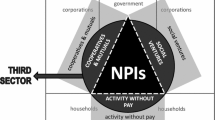Abstract
Although social economy (SE) institutions are widely credited with generating significant social benefits, measuring their actual impact on society has been a daunting task. The assessment of social economy contributions toward broader policy goals requires a macro-level perspective, allowing a comparison of social economy institutions to other types of economic actors across industries and countries. A conceptual framework allowing such a macro-level analysis has been developed with the Satellite Account on Non-profit and Related Institutions and Volunteer Work, which provides a set of officially sanctioned recommendations and methodologies for separate identification of social economy institutions in the national economic statistics known as the System of National Accounts (SNA). This chapter offers a brief introduction of this methodology to the general audience that may not be familiar with the technical intricacies of the SNA.
S. Wojciech Sokolowski passed away before this volume went to press.
Access this chapter
Tax calculation will be finalised at checkout
Purchases are for personal use only
Similar content being viewed by others
Notes
- 1.
- 2.
The social economy sector also includes the volunteer work component, which is outside the scope of this chapter.
- 3.
A list of central products can be found in the Central Product Classification (United Nations, 2015</CitationRef>).
References
Abraham, K. G., & Mackie, C. (Eds.). (2005). Beyond the market: Designing nonmarket accounts for the United States. National Academic Press.
Board of Governors of the Federal Reserve System. (2011). Proceedings of the conference on advancing social impact investments through measurement, Washington, DC.
Gifford, P. (1971). France and Britain in Africa: Imperial rivalry and colonial rule. Yale University Press.
Mill, J. S. [1882, 2009], A system of logic, ratiocinative and inductive. Retrieved from https://www.gutenberg.org/files/27942/27942-h/27942-h.html
Olsen, S., & Galimidi, B. (2008). Catalog of approaches to impact measurement: Assessing social impact in private ventures. Social Venture Technology Group.
Thornley, B., & Dailey, C. (2010). Building scale in community impact investing through nonfinancial performance measurement. Community Development Investment Review, 6(1), 1–46.
United Nations. (2015). Central product classification (CPC) (Vol. ver. 2.1). United Nations.
United Nations. (2007). Indicators of sustainable development: Guidelines and methodologies. United Nations.
United Nations. (2009). System of National Accounts 2008. United Nations.
United Nations. (2018). Satellite account on non-profit and related institutions and volunteer work. United Nations.
W. K. Kellogg Foundation, & W. K. (2001). In B. Creek (Ed.), Kellogg foundation logic model development guide. W. K. Kellogg Foundation.
Author information
Authors and Affiliations
Editor information
Editors and Affiliations
Rights and permissions
Copyright information
© 2022 Springer Nature Switzerland AG
About this chapter
Cite this chapter
Sokolowski, S.W. (2022). Using the System of National Accounts Framework to Measure Social Impacts of Social Economy Institutions. In: Hoelscher, M., List, R.A., Ruser, A., Toepler, S. (eds) Civil Society: Concepts, Challenges, Contexts. Nonprofit and Civil Society Studies. Springer, Cham. https://doi.org/10.1007/978-3-030-98008-5_8
Download citation
DOI: https://doi.org/10.1007/978-3-030-98008-5_8
Published:
Publisher Name: Springer, Cham
Print ISBN: 978-3-030-98007-8
Online ISBN: 978-3-030-98008-5
eBook Packages: Social SciencesSocial Sciences (R0)




